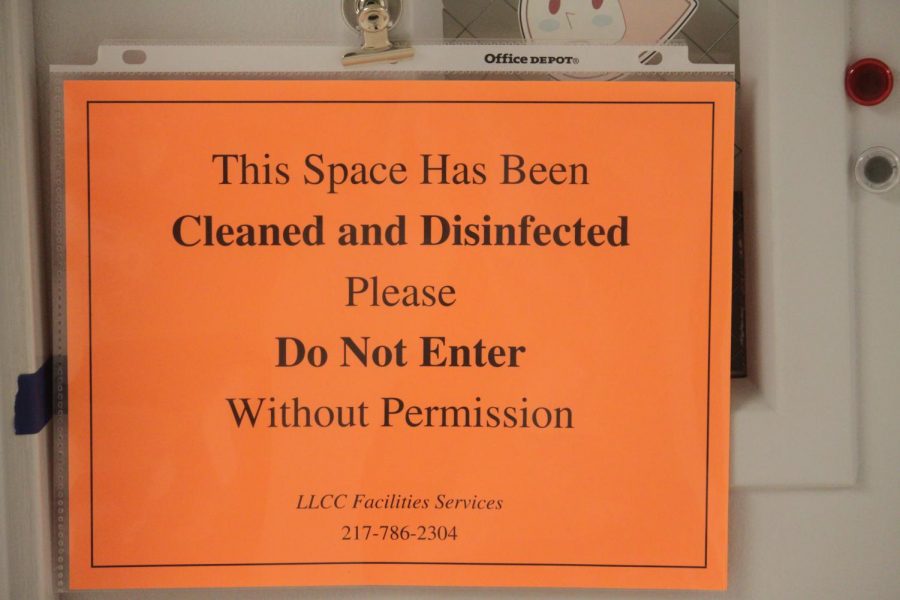College cuts online fees amid shifting class formats
A sign informs people that an office on the second floor of Menard Hall has been cleaned and disinfected on Monday, Oct. 19, 2020. Almost every classroom and office on campus is marked with these signs as most students take their classes online.
October 26, 2020
Students taking classes online at Lincoln Land have always had to pay an extra technology fee, originally set at $39.75 per credit hour for 2020-21 school year. When the college moved online, that fee may have stung a bit, adding hundreds of dollars to a semester of classes.
On July 20, the college cut online fees down by 50% for the fall semester, as the majority of courses were moved to alternative formats. The new fee is $19.87 per credit hour.
“Online classes carry an additional fee to help pay for the technical infrastructure required to provide the course online and to provide the additional training required for faculty to teach their classes online,” said Lynn Whalen, chief communications officer. “LLCC wanted to assist students during this challenging time by reducing the cost of the online fee.”
The in-district tuition rate for 2020-21 is $133 per credit hour. An in-district student taking an in-person, 3-credit-hour class would pay $399 in tuition fees. The same class offered online would add an additional online fee of $119.25 – but with the reduced rate, that student will now pay $19.87 per credit hour – taking that fee down to $59.61. A 3-hour online class this would cost only $458.61 this fall.
“Cutting the online fee by 50 percent can save students hundreds of dollars in these uncertain financial times,” LLCC President Charlotte Warren said. “As always, we will provide our students with a quality, affordable education this fall.”
Tuition and fees vary based on program and other factors. A full list of tuition and fees at Lincoln Land Community College is available at www.llcc.edu/tuition-and-fees.
“In order to ensure LLCC instructors were prepared for the level of online and remote education they would be delivering, LLCC made significant investments to train and prepare our instructors for the format change,” said Bryan Gleckler, vice president of administrative services. “These types of investments are why LLCC has been and continues to be a leader in the overall quality of our online instruction.”
Officials say students this fall had many different needs, including safety, work schedules, and child care. Lincoln Land offered four different formats of classes: online, remote, flex, and face-to-face, so students could choose their preferred learning environments.
The college also distributed laptops to students in need, and more than $1 million in federal CARES Act funds to more than 3,100 eligible students.
Books also remained a major expense for students. Some instructors chose online textbooks which helped many students save money, but for those needing a physical book, they were still able to order them online and pick them up in the Student Union.
Students have access to the Center for Academic Success where they can work with tutors remotely this fall.
Even though the cost of virtual online learning is more than that of in-person classes, half of students still prefer it due to the many benefits it has.
